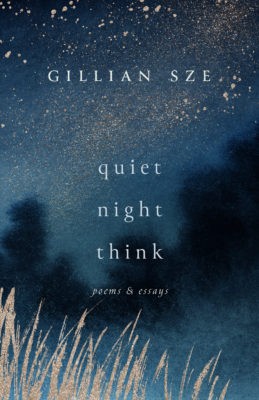Dream of No One but Myself Brick Books
David Bradford
$22.95
paper
111pp
9781771315609§
A founding editor of House House Press, a Tiohtiá:ke/Montreal-based publisher focused on radical BIPOC writing practices, Bradford inquires into his own and his parents’ interconnected experiences, stepping into different personae and cadences. Dreamlike, narrative threads are held together by captivating lyricism, interspersed with reflective essayistic passages, confidential footnotes, self-defaced writings, and collaged photographs and ephemera of childhood that ground the book.
…………….Remember that day?
Then our mouths numb
working lemon water easy
Now the month and six
. hours in between lifelines
……………a white noise machine
Bradford’s collection of form-and-font-shifting poetry manifests a familial mystery that looks less for solutions than laying his own and others’ memories bare, however unreliable or ephemeral they may be. This anti-hero’s quest is shared piece by piece, not in aphorisms but a collection of poetic complications of identity, race, and intergenerational trauma.
The .abused .son of .the .abused .father
reaching out to the..survivor-survivor
grandmother,. the. …still-hanging-on-
by-the-oxygen-tank…………daughter
of……a…….brothel’s…….madam.
Everything…to…wade…thru…forever
trickling..in .the .muddied ..background.
Everything……..else…………..gone.
I…think….of….calling…her...I..don’t.
Parents’ memories and lives bleed into their children’s and, over time, memories and their meanings alter into a collage. Bradford’s mosaic shows how permeable the boundaries of oneself are, breached or blown up by all the stories and seemingly small things that compose us.
His old value human gift.
Dust in a pine can. Six
years in the Delaware
I ain’t ever getting back. No
plot. Ever safe from anyone.
Too late to help. Or stop
letting what I lost.
Be what I lost.
***
Mother Muse Signal Editions
Lorna Goodison
$19.95
paper
96pp
9781550655988
Ultimately, people are the heart of Goodison’s poems, conveying their individuality as inextricably tied to culture, place and politics. In Mother Muse, focus returns again and again to two “mothers” in Jamaican music: Sister Mary Ignatius “Sister Iggy” and dancer Anita “Margarita” Mahfood, who, even if limited by social norms or misogynistic abuse, inspired in others a love of music and creativity as fundamental to life and personal – and political – strength.
Alumnus of Alpha Boys School for the wayward, his mother
handed him over to Sister Mary Ignatius, nun more deserving
of a T.V. show than the high flying one of starched cornette;
she was a devotee of rhythm and blues, jazz, bebop
and all other worldly music. Athlete and able coach of cricket,
boxing, football, netball, and table tennis.
Sister Iggy, as deejay, played the speeches of Malcolm X
for young Black men she helped master musical instruments.
Goodison’s poems hold a similar strength of mind, mapped onto present day happenings and memories, deliberate and knowing on a range of topics. Whether writing about the personal or historical, she is able to blend the two without forced symbolism – meaning arises from the physicality of her imagery and careful, sometimes playful, sometimes reverential word choice.
Contest meant for near white weepdroppers to win.
White in their own eyes till they go to foreign,
and find out what a disqualifier their wee drop
of black blood is. It is then they come back.
Blacker than black: Blackness retroactive.
What can be learned about people and culture from Mother Muse is equal to what the book can inspire in social and creative acts. Goodison sheds light on how sharing stories helps us make sense of our world while illuminating the under-explored multitudes that shape it.
A critic on Fox writes her off, gives her thumbs down
for acting all arrogant; for not taking directions.
For her part, all she did was leave home, drive her car
and change lanes. Say her name.
***
Infinity Network Signal Editions
Jim Johnstone
$19.95
paper
78pp
9781550655971
The mathematical symbols that name the book’s chapters move from zero to integral to infinity – that is, the book’s themes fittingly and auspiciously circle back on themselves, an ouroboros narrator with a body constructed of words. Bodies themselves ramble around an increasingly digital world in Johnstone’s poems, looking for meaningful mirrors or relationships and finding simulacra, constantly reminded of their fallible and contradictory ways.
together, if only just to laugh
off truth—meme, meaning,
identity—the ground floor
where we disguise, despite everything,
as wolves in wolves’ clothing.
Infinity Network appears to look inward at itself too, indirectly examining the observational and meaning-making place of poetry in an increasingly technological, multivalent culture. What is fleeting and what is meaningful converge in Johnstone’s skillful, dreamlike – or fantastically big-screen-like – imagery. Repeated and related words gain and lose meaning in the same poem; mirrors and books and bodies are broken.
The fleeting feeling
of an unanswered punch.
The sky compressed
like an empty sponge.
In Johnstone’s visceral, disorienting images is a clarity that all is not right with the world. Yet we still must exist in it one way or another – the question is where to place our attention and efforts, how to recognize each other and relate, even how to stay alive.
The wall defines our lack of sovereignty.
You
and I
and everyone else
who isn’t.
Isn’t permanent
or part
of the panoply.
***
Quiet Night Think ECW Press
Gillian Sze
$21.95
paper
92pp
9781770416253
A gorgeous opening poem sets the tone for Sze’s exploration of languages and associated cultures, questioning the very meaning of words, their symbolic origins, and translations not only between different languages but between different people.
The fern is another word
for memory.
Watch the clouds
as they knit their way
across the night.
What I want to tell you
is imperative—
that we are flawed
and exalted,
that there are those
who still look to the raven for rain.
The book’s titular essay sets the book’s stage and shows Sze’s innate curiosity and depth of thought, explaining that “Quiet Night Think” is the direct translation of the title of a famous eighth-century Chinese poem by Li Bai, which Sze remembers reading and translating as a child growing up in Winnipeg. It’s this short poem that inspired Sze to contemplate language and meaning throughout her life.
She writes, “What is this space that poetry offers? Creative space. Emotional space. Reflective space. A space for possibilities… Loss, as my mother already knew, is what provides the space from which meaning can emerge.”
As Sze’s understanding of the poem evolves past childhood, she uncovers its labyrinthine relationship to her own writing. Her reflections on family are coupled with her reflections on poetry, which both peer into transformational moments and the elements of growth.
A black squirrel leaps from the balcony
to the moss-fringed maple: bracket to branch.
Fog against cloud, the sky whispers to the birds arcing,
Where do you go when I look away?
The book’s other essays offer similar insight into poetry and language, accessed through generously told stories of Sze’s family and her experiences as a mother. The poetry of Quiet Night Think unsurprisingly echoes Li Bai’s poem without mimicking it: Sze draws on emotion-imbued imagery from nature, daily observations and intellectual investigations, punctuated by intimate, often heart-rending glimmers that captivate all the way to the book’s end.
***
Des Monsteras Vallum Chapbook Series No. 33
Heather White
$12
paper
23pp
9781990152023
I’m a foolish
new theme park, kitschy in the long
shadow of ancient ruins.
The chapbook’s subtitle, “a long poem,” immediately plants the suggestion that the poems on each page relate beyond overarching themes and memoir traits. Des Monsteras delivers on that promise through an abstracted narrative, full of emotional edges and deliberate words that chime against each other within and across the pages.
I slept and woke up remembering
that demonstrate comes from the
same root as monster. Both are
about pointing out or warning,
showing, montrer.
Firmly set in the present day, with all its conspicuous pop culture and social media material, Des Monsteras digs into deeper personal concerns in pandemic times and the observations, songs, and half-remembered conversations that fill our days. White queries Taylor Swift lyrics as she listens (and sometimes cringes) while roaming through Montreal in winter, as if writing these poems while in motion, searching out a tune of her own to move by.
… Aren’t we
all just striving to return ourselves
finally to the world? In love you get
returned to it by someone, who
might begin by holding your face. mRb






0 Comments